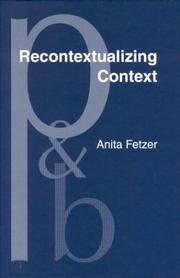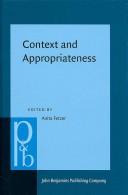| Listing 1 - 10 of 29 | << page >> |
Sort by
|
Book
ISBN: 9789027256331 Year: 2013 Publisher: Amsterdam Benjamins
Abstract | Keywords | Export | Availability | Bookmark
 Loading...
Loading...Choose an application
- Reference Manager
- EndNote
- RefWorks (Direct export to RefWorks)
Politics --- Sociolinguistics --- Pragmatics --- Discourse analysis --- Pragmatics. --- Analyse du discours --- Pragmatique --- Political aspects. --- Aspect politique

ISBN: 9027253633 1588115100 9786612160608 1282160605 9027295719 Year: 2004 Volume: 121 Publisher: Amsterdam Benjamins
Abstract | Keywords | Export | Availability | Bookmark
 Loading...
Loading...Choose an application
- Reference Manager
- EndNote
- RefWorks (Direct export to RefWorks)
In the humanities and social sciences, context is one of those terms which is frequently used and frequently referred to, but hardly made explicit.This book proposes a model for describing the multifaceted connectedness between language and language use, and between cognitive context, linguistic context, social context and sociocultural context and their underlying principles of well-formedness, grammaticality, acceptability and appropriateness. Combining a range of theoretical frameworks in linguistics, pragmatics, sociolinguistics, discourse analysis and philosophy of language, Fetzer goes beyond the unilateral conception of speech and argues for a dialogue outlook on natural-language communication based on dialogue principles and dialogue categories. The most important ones are cooperation, joint production, micro and macro communicative intentions, micro and macro validity claims, co-suppositions, dialogue-common ground and communicative genre.
801.56 --- 801.56 Syntaxis. Semantiek --- Syntaxis. Semantiek --- Grammar --- Pragmatics --- Context (Linguistics) --- Grammaticality (Linguistics) --- Acceptability (Linguistics) --- Acceptability (Linguistics). --- Context (Linguistics). --- Grammaticality (Linguistics). --- Grammaticalness (Linguistics) --- Grammar, Comparative and general --- Linguistics --- Situation (Linguistics) --- Sociolinguistics --- Context --- LANGUAGE ARTS & DISCIPLINES --- Linguistics / General --- Philology & Linguistics --- Languages & Literatures

ISBN: 1282152904 9786612152900 9027292256 9789027292254 9027254060 9789027254061 9789027254061 Year: 2007 Publisher: Amsterdam Philadelphia J. Benjamins Pub. Co.
Abstract | Keywords | Export | Availability | Bookmark
 Loading...
Loading...Choose an application
- Reference Manager
- EndNote
- RefWorks (Direct export to RefWorks)
This book departs from the premise that context and appropriateness represent complex relational configurations which can no longer be conceived as analytic primes but rather require the accommodation of micro and macro perspectives to capture their inherent dynamism. The edited volume presents a collection of papers which examine the connectedness between context and appropriateness from interdisciplinary perspectives. The papers use different theoretical frameworks, such as situation theory, speech act theory, cognitive pragmatics, sociopragmatics, discourse analysis, argumentation theory and functional linguistics. They reflect current moves in pragmatics and discourse analysis to cross disciplinary and methodological boundaries by integrating relevant premises and insights, in particular cognition, negotiation of meaning, sequentiality, recipient design and genre.
Discourse analysis. --- Context (Linguistics) --- Speech acts (Linguistics) --- Acceptability (Linguistics) --- Pragmatics. --- Illocutionary acts (Linguistics) --- Speech act theory (Linguistics) --- Speech events (Linguistics) --- Language and languages --- Linguistics --- Speech --- Grammar, Comparative and general --- Situation (Linguistics) --- Discourse grammar --- Text grammar --- Semantics --- Semiotics --- Pragmalinguistics --- General semantics --- Logic, Symbolic and mathematical --- Semantics (Philosophy) --- Grammaticality (Linguistics) --- Sociolinguistics --- Philosophy --- Context

ISBN: 1282160605 9786612160608 9027295719 9789027295712 9027253633 9789027253637 9781588115102 1588115100 1588115100 Year: 2004 Publisher: Amsterdam Philadelphia J. Benjamins
Abstract | Keywords | Export | Availability | Bookmark
 Loading...
Loading...Choose an application
- Reference Manager
- EndNote
- RefWorks (Direct export to RefWorks)
LANGUAGE ARTS & DISCIPLINES --- Linguistics / General --- Context (Linguistics) --- Grammaticality (Linguistics) --- Acceptability (Linguistics) --- Philology & Linguistics --- Languages & Literatures --- Linguistics --- Sociolinguistics --- Grammaticalness (Linguistics) --- Grammar, Comparative and general --- Situation (Linguistics) --- Context
Book
ISBN: 1299440207 9027272395 9789027272393 9027256330 9789027256331 9781299440203 Year: 2013 Publisher: Amsterdam
Abstract | Keywords | Export | Availability | Bookmark
 Loading...
Loading...Choose an application
- Reference Manager
- EndNote
- RefWorks (Direct export to RefWorks)
Using political discourses produced from below, i.e. by the common people in Cameroon rather than by prominent politicians, this chapter illustrates how the social act of thanking is realised in the written political discourse sub-genre called 'motions of support'. These are letters read on radio or TV or published in newspapers, addressed to the president thanking him for a political favour or action deemed beneficial to the group writing the motion. In most of these open letters, groups of people extend thanks to the president for appointing a member of their community, ethnic group, town,
Discourse analysis --- Pragmatics. --- Pragmalinguistics --- General semantics --- Language and languages --- Logic, Symbolic and mathematical --- Semantics (Philosophy) --- Discourse grammar --- Text grammar --- Semantics --- Semiotics --- Political aspects. --- Philosophy

ISBN: 9789027254061 Year: 2007 Publisher: Amsterdam Benjamins
Abstract | Keywords | Export | Availability | Bookmark
 Loading...
Loading...Choose an application
- Reference Manager
- EndNote
- RefWorks (Direct export to RefWorks)
Pragmatics --- Acceptability (Linguistics) --- Context (Linguistics) --- Discourse analysis --- Speech acts (Linguistics) --- Illocutionary acts (Linguistics) --- Speech act theory (Linguistics) --- Speech events (Linguistics) --- Language and languages --- Linguistics --- Speech --- Pragmalinguistics --- General semantics --- Logic, Symbolic and mathematical --- Semantics (Philosophy) --- Discourse grammar --- Text grammar --- Semantics --- Semiotics --- Grammar, Comparative and general --- Situation (Linguistics) --- Grammaticality (Linguistics) --- Sociolinguistics --- Philosophy --- Context
Book
ISBN: 3631472080 Year: 1994 Publisher: Frankfurt am Main Lang
Abstract | Keywords | Export | Availability | Bookmark
 Loading...
Loading...Choose an application
- Reference Manager
- EndNote
- RefWorks (Direct export to RefWorks)

ISBN: 9027253439 1588112330 9781588112330 9789027253439 9786612160981 1282160982 9027296219 9789027296214 9781282160989 6612160985 Year: 2002 Publisher: Amsterdam Benjamins
Abstract | Keywords | Export | Availability | Bookmark
 Loading...
Loading...Choose an application
- Reference Manager
- EndNote
- RefWorks (Direct export to RefWorks)
This book addresses current approaches to sequentiality in pragmatics and discourse analysis. It reflects the current moves in ethnomethodological conversation analysis and speech act theory to cross methodological borders to arrive at a conception of a sequence, which extends the local notion of sequentiality by integrating further constitutive components, such as cognition, intentionality, activity type, culture and genre. The individual contributions were presented at the 7th IPrA Conference held in Budapest in the year 2000. They range from critical analyses of speech act theory and cognitive pragmatics to detailed micro analyses of genre- and activity-specific constraints on the production and interpretation of meaning. The first part "sequences in theory and practice: minimal and unbounded" discusses the theoretical premises and exemplifies these by detailed data analyses. The second part "sequences in discourse: the micro-macro interface" examines genre-specific constraints on individual sequences and shows the benefits of supplementing the microanalytic concept of sequentiality with macroanalytic categories.
Pragmatics --- Analyse du discours --- Discourse analysis. --- Interaction sociale --- Sequence (Linguistics). --- Sequenties. --- Social interaction. --- Séquence (Linguistique) --- Sequence (Linguistics) --- Human interaction --- Interaction, Social --- Symbolic interaction --- Exchange theory (Sociology) --- Psychology --- Social psychology --- Sequencing (Linguistics) --- Sequentiality (Linguistics) --- Discourse analysis --- Linguistics --- Order (Grammar) --- Discourse grammar --- Text grammar --- Semantics --- Semiotics
Book
ISBN: 9027261970 9789027261977 9789027204288 9027204284 Year: 2019 Volume: 307 Publisher: Amsterdam John Benjamins Publishing Company
Abstract | Keywords | Export | Availability | Bookmark
 Loading...
Loading...Choose an application
- Reference Manager
- EndNote
- RefWorks (Direct export to RefWorks)
"Departing from the premise that 'being ordinary' is brought into the discourse and brought out in the discourse and is thus an interactional achievement, the contributions to this edited volume investigate its construction, reconstruction and deconstruction in media discourse. Ordinariness is perceived as a scalar notion which is conceptualised against the background of both non-ordinariness and extra-ordinariness. The chapters address its strategic construction across media genres (public talk, Prime Minister's Questions, interview, radio call-in, commenting) and discursive activities (tweets, social media posts) as done in various languages (American English, Austrian German, British English, Chinese, French, Finnish, Hebrew and Japanese) by professional participants (e.g., politicians, journalists, scientists) and by ordinary people participating in media discourse (e.g., ordinary citizens, viewers, members of the audience). Discursive strategies used to bring about (non/extra) ordinariness include small stories, quotations, conversational style, irony, naming and addressing as well as references to the private-public interface"--
Mass media and culture. --- Culture and mass media --- Culture --- Mass media and culture --- Communication --- Communication and culture --- Social aspects --- Social aspects. --- Mass communications --- Pragmatics
Book
ISBN: 9789027256133 9789027286635 9027286639 1283128233 9781283128230 9027256136 9786613128232 6613128236 Year: 2011 Publisher: Amsterdam Benjamins
Abstract | Keywords | Export | Availability | Bookmark
 Loading...
Loading...Choose an application
- Reference Manager
- EndNote
- RefWorks (Direct export to RefWorks)
From an adaptive perspective, context construction is construable as a way of handling variation in the external environment. As such, it is as part of the action selection process, which is governed by adaptive values. This contribution examines in what way context results from the intervention of such values. By contrast with more mainstream approaches, which tend to favour a personal level of analysis, this project views context in terms of perceptual and conceptual categorization, attention selection and decision making. The underlying assumptions are drawn mainly from Damasio's model of decision making (Damasio 1994) and Edelman's Theory of Neuronal Group Selection (Edelman 1989, 1992), both of which are concerned with how the brain - as a selective system - handles contextual change.
Pragmatics --- Context (Linguistics) --- Discourse analysis --- Social interaction --- Human interaction --- Interaction, Social --- Symbolic interaction --- Exchange theory (Sociology) --- Psychology --- Social psychology --- Discourse grammar --- Text grammar --- Semantics --- Semiotics --- Grammar, Comparative and general --- Situation (Linguistics) --- Linguistics --- Context --- Discourse analysis. --- Social interaction.
| Listing 1 - 10 of 29 | << page >> |
Sort by
|

 Search
Search Feedback
Feedback About UniCat
About UniCat  Help
Help News
News